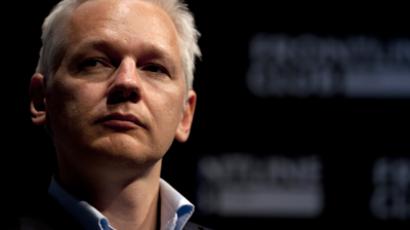‘Cypherpunks’: New Assange book says Internet may enslave us
WikiLeaks founder Julian Assange has co-authored a book arguing that the world is at a pivotal decision: Whether the Internet will free us, or enslave us. Assange, famous for his ‘hacktivism,’ used a decidedly low-tech medium for his latest polemic.
Titled ‘Cypherpunks: Freedom and the Future of the Internet,’ the book is partially based on RT’s ‘The World Tomorrow’ television series. In several episodes, Assange interviewed his co-authors, Jacob Applebaum of the US, Jeremie Zimmermann of France and Andy Müller-Maguhn of Germany.The book describes cypherpunks as advocates of citizens using cryptography to secure their electronic communications from both government and corporate spying. In the book, they discuss how the Internet can be both an instrument of freedom and oppression. ‘Cypherpunks’ examines issues like government and corporate online surveillance, the filesharing phenomenon and attempts to curb it with anti-piracy laws, and how users have become willing collaborators with those who collect their personal data.The authors claim that the world is witnessing a pivotal conflict over whether “electronic communications will emancipate or enslave us,” the book’s New York-based independent publisher OR Books said.
Assange previously authored several essays and researched material for his 1997 book ‘Underground: Tales of Hacking, Madness and Obsession on the Electronic Frontier,’ which followed the exploits of an international group of hackers.‘Cypherpunks’ was published despite the fact that Assange is still holed up in Ecuador’s London embassy, which granted him asylum in August.The WikiLeaks founder requested asylum to avoid being extradited to Sweden, where he is wanted for questioning over allegations of sex crimes. He believes that he would be re-extradited to the US after arriving in Sweden, and then put on trial for his publication of classified US diplomatic cables. Assange has expressed concern that he would be sentenced to an unjustly long prison term, or even death, in the US.
Speaking to RT, Jeremie Zimmermann, the co-author of the book and the co-founder of citizen advocacy group La Quadrature du Net, stressed the importance of Internet freedom.“The Internet and digital technology could be turned either into the worst totalitarian machine for surveillance and control of the people, or into a way of including ourselves and including societies with better democratic participation, better access to culture and better sharing of knowledge between individuals,” he said.Zimmermann warned that more and more countries and governments are enforcing control over individuals and their online activities. He suggested that this should be fought by by spreading information about how freedoms are attacked online. “So, by informing each other, by sharing knowledge, we can build tools to collectively act, to participate in a public process – to participate in the democratic process. And then we can try to increase the political costs of making these bad decisions that will lead to turning the Internet into a machine to control individuals.”














